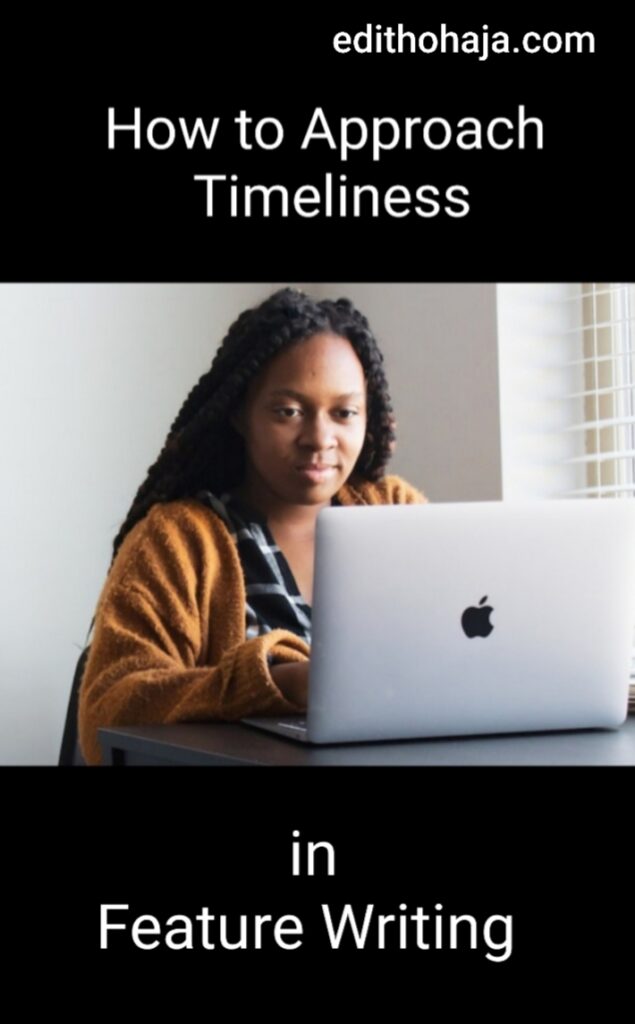How to Approach Timeliness in Feature Writing
We have just published an interview feature on The Record¹¹ newspaper’s website and I want to clarify how to approach timeliness in feature writing. This is because it appears some young writers are confused about how long they are permitted to take to compose a feature story.
Although a feature story can take longer to assemble and publish than a straight news story, undue delay can make the subject irrelevant. It may seem stale and over-flogged by the time your story is out. For that reason, I recently disallowed a story based on first-year orientation on campus. The writer took her sweet time with it.
What to bear in mind though is that there are different types of features which allow different levels of timeliness.
A news feature, for instance, is a story about an event which requires feature treatment. Since the story is event-based, you don’t need to do extensive research to report it. You just need to add the necessary background and tell the story of the event in a leisurely or entertaining manner.
However, one may choose to write a different kind of feature as an offshoot of an event which has been covered in straight news and news features. You may focus on a personality involved in the event or an aspect of the event.
Take the last edition of the Youth Digest Campus Journalism Awards held in December last year as an example. The event was covered in different media. A student recently decided to interview the overall winner and get more information about her journalism journey, her niche and vision. Since the winner still holds the position she won and applications for the next edition of the contest typically close by the end of October each year, the story is still timely.
But when you write a story on a subject later than others, you must ensure you have a fresh angle so that readers can find good reason to give it their attention.

Another student can choose to do a story on campus journalism outfits in different schools and how they are doing, possibly looking at the schools some of the winners of the awards have come from.
Other possible offshoots could be utility features on how to write award-winning articles, how to give public speeches (prepared and extemporaneous) and how to build a writing portfolio to impress employers.
Someone could also choose to do an interpretative feature on the work of journalists in the contemporary age and the significance of it.
Such stories would usually include information about the awards which inspired writing them, pointing out their aim and some past winners as background material. The writers may even mention other similar awards.
What makes these stories relevant is that they may expose new people to these awards, some schools may be challenged to establish or improve their campus journalism outfits, prospective contestants would find the guidelines for excelling in their writing and public speaking helpful ….
But if you want to write a feature story on an issue like the crisis emanating from the scarcity of new Naira notes, your story should be submitted while the crisis is ongoing, except you want to draw lessons from the fiasco in hindsight. So the more fleeting the issue, the faster you should work on it.
Takeaway: Write feature stories based on events and fleeting issues faster but take more time to address their offshoots or features that address matters outside the news.
Note:
¹The Record newspaper is published by the Department of Mass Communication, University of Nigeria, Nsukka.
You may also like these related posts:


Amazingly enlightening
Praise God!
Your teaching is always insightful and purposeful.
To get the background /contextual part of an event and at thesame time deliver the story at the appropriate time without it being stale has been my challenge.
But with the knowledge I got from this, I believe I can do much better.
God bless you ma.
I want dis part 2 sink into2 my head “fresh angle so that readers can find good reason to give it their attention.”
Well explained. God bless you
Thank you so much ma. I’m so glad this is so helpful. Message is well received.
Mum, this was indeed helpful. Thanks for sharing. God bless you, Ma
Thanks for the feedback. God bless you too!
Thanks so much, Mum! This is really educating and enlightening.
You’re welcome!
This is helpful, ma’am.
I’m happy to hear that!
Love this !
I had to read with my pencil at hand , couldn’t miss some points 🥳🥳🥳
Way to go, dearie! May God take you higher than you anticipate in Jesus’ name. 🙏
Write a story fast before it gets stale.
If stale, write a new angle to it.
New angle must be informative and have value.
This is so insightful, thank you ma.
This will really go a long way in helping reporters and future journalists. You are really doing a good job. Bravo.
Feature writing must be specified on that main event that happened you must go straight to the point and not beat about the bush
You are mixing things up. Read the post again.
I have to read the three times before I could understand and it was very helpful indeed . Thank you 🤗 ma
This you ma for the enlightenment. Now I know that I either have to write a story in the heat of the subject or write from a different angle after the heat of an event. Really helpful.
One would not know that there’s more to writing till you are exposed to knowledge,
“The more fleeting the issue the faster you should run with it” I will definitely keep these words close to my heart so that when I’m writing I can use of the techniques I learnt from here. This is such a beautiful piece
Writing a feature story has always been frightful to me cause I thought about how to start and what to talk about.. But after reading this article, I know I can now pick up my pen and go to work…..
God bless you ma
a really insightful write up ma…
I got to understand that feature writings should be done while the issues being written on are still ongoing.
in regards to this comment, I also realized from this writeup that the interest of the public is captured when the news in particular is reported in a timely manner.
A story is best served when it’s hot. Else it become cold and stale and of no importance to the public.
This truly very insightful thanks ma this very educative piece
Thank you ma for this educative advice may God continue to bless you
I thought I knew enough but after reading this post, I have been able to understand more about featured writing. Timeline matters!!
Thank you ma for sharing this knowledge with us.
Ma your work always seems to amaze me Ma
Your work is amazing 👏
Thank you ma for the knowledge you shared.
This is very helpful, thank you ma and God bless you abundantly
Really enlightening and insightful, I really learnt a lot and hopefully I’ll improve with the points I’ve gotten from here.
Insightful and enlightening. Took down some notes. Thank you ma.
This was really insightful and educative. I learnt alot about feature writing. Thank u Aunty Edith
I seriously had to note some things down… couldn’t hold myself..very educative piece ma… Keep up the good work!
Thank you so much for educating me through your blog mummy.
Features are best published when the story/crisis are still trending.
Thank you for sharing, ma
God bless you, ma, for providing the balance between timeliness and staleness of news in feature writing.
This enlightened me, I thought feature stories were old stories but I understand the Timeliness better.
Wow! This so helpful. Thank very much ma
Thank you so much ma! This is really educating and enlightening. It is helpful indeed.
Wow! Your blog is always helpful ma.
This is class after class. Thanks sweet mum for the knowledge you shared. I feel blessed having you as a lecturer and a teacher. 😘
I’m enlightened. The art of feature writing is not only about writing creatively but also timely submission of feature stories. Thanks ma’am
Every writing has a time limit no matter how engrossed the writer might be in the write-up. Timeliness in hand with skill could go a long way. Thank you ma😊.
Feature stories should be fleshy and yet timely. It is like adding more background to a hard news story. Thank you Ma for this.
They are not always very timely.
Thank you ma,
It’s educating.
I have learned more from this blog.
God bless you ma!
Feature story and its definition gets one thinking that he can actually write everything on that event including on personalities which would take more time based on research. So now ive learnt that one can take more time on his feature writing if the person decides to write an offshoot story so that the story doesn’t become stale and uninteresting. For example if I want to write on the recently concluded reality show BBN, i need to write on it fast because soon the story would become uninteresting to readers as they see it as one that had happened long time ago. But if i decide to write on the winner of the show, then I can make more research on the person,then people would be more interested in reading the story as they would want to learn more. Thank u so much ma.
Waw this piece really gave me more insight and knowledge of feature writing. Thanks so much ma’am because I no that I’m not leaving this page as I was when I came first. I have grabbed something to lean on.
This text effectively clarifies the distinction between news features and traditional news reporting, emphasizing the more narrative and leisurely approach of news features. This distinction is essential for aspiring journalists to understand the different storytelling techniques used in journalism. Thank so much for this Ma
The point about the importance of finding a fresh angle when writing a news feature on a subject that has already been covered highlights the need for originality and reader engagement. It serves as a valuable reminder for writers to add depth and uniqueness to their feature articles, ensuring they resonate with their audience.
feature writing is educational as it goes deep into topics providing historical context and allowing the readers have a better understanding of the subject. thank you for this educational piece.
This indeed is very helpful. There are some feature writing that needs to be done when the trending issue is going on if not when they are written after the trending issue happens, audience may not be interested in reading them.